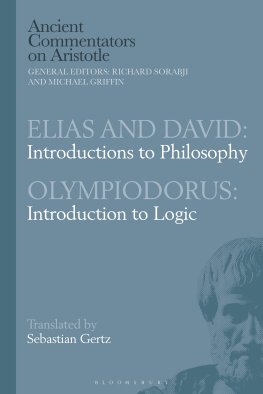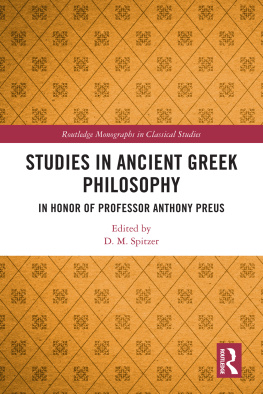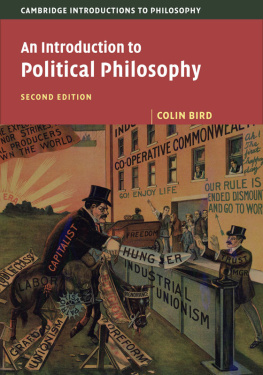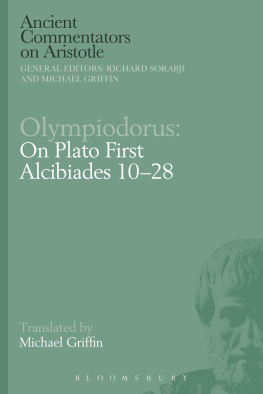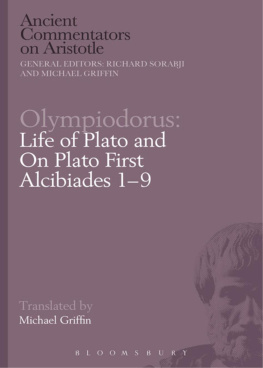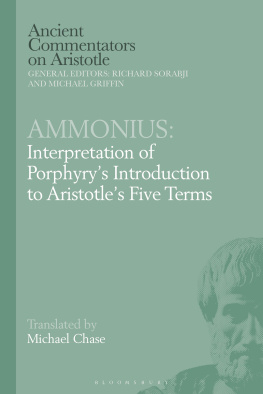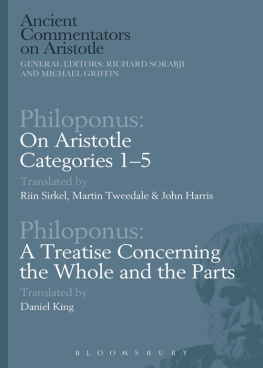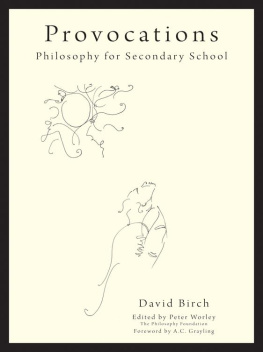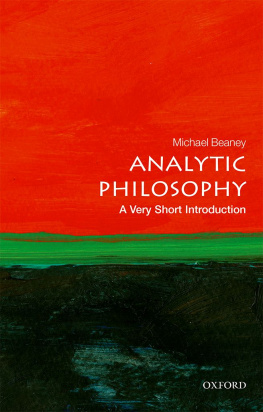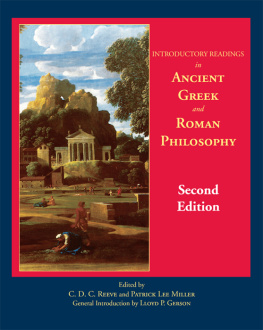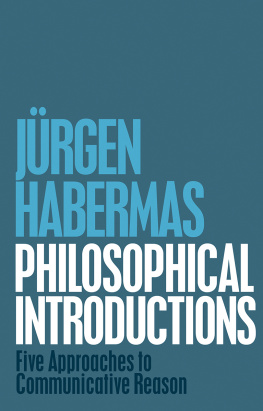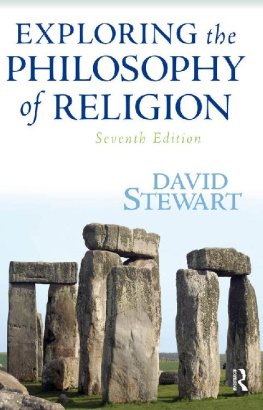
Elias and David
Introductions to Philosophy
with
Olympiodorus
Introduction to Logic
Ancient Commentators on Aristotle
GENERAL EDITORS: Richard Sorabji, Honorary Fellow, Wolfson College, University of Oxford, and Emeritus Professor, Kings College London, UK; and Michael Griffin, Assistant Professor, Departments of Philosophy and Classics, University of British Columbia, Canada.
This prestigious series translates the extant ancient Greek philosophical commentaries on Aristotle. Written mostly between 200 and 600 AD, the works represent the classroom teaching of the Aristotelian and Neoplatonic schools in a crucial period during which pagan and Christian thought were reacting to each other. The translation in each volume is accompanied by an introduction, comprehensive commentary notes, bibliography, glossary of translated terms and a subject index. Making these key philosophical works accessible to the modern scholar, this series fills an important gap in the history of European thought.
A webpage for the Ancient Commentators Project is maintained at ancientcommentators.org.uk and readers are encouraged to consult the site for details about the series as well as for addenda and corrigenda to published volumes.

Contents
The present translations have been made possible by generous and imaginative funding from the following sources: the National Endowment for the Humanities, Division of Research Programs, an independent federal agency of the USA; the Leverhulme Trust; the British Academy; the Jowett Copyright Trustees; the Royal Society (UK); Centro Internazionale A. Beltrame di Storia dello Spazio e del Tempo (Padua); Mario Mignucci; Liverpool University; the Leventis Foundation; the Arts and Humanities Research Council; Gresham College; the Esme Fairbairn Charitable Trust; the Henry Brown Trust; Mr and Mrs N. Egon; the Netherlands Organisation for Scientific Research (NWO/GW); The Ashdown Trust; the Lorne Thyssen Research Fund for Ancient World Topics at Wolfson College, Oxford; Dr Victoria Solomonides, the Cultural Attach of the Greek Embassy in London; and the Social Sciences and Humanities Research Council of Canada. The editors wish to thank Michael Atkinson, Jonathan Barnes, Cristina DAncona, Barrie Fleet, Mossman Rouch, and Robert Thomson for their comments; John Sellars for preparing the volume for press; and Alice Wright, Commissioning Editor at Bloomsbury Academic, for her diligence in seeing each volume of the series to press.
[] Square brackets indicate additions to the translation for the sake of greater clarity.
<> Angle brackets indicate additions to the Greek text. Notes to the translation provide further details on textual matters.
{} Curly brackets indicate suggested deletions of text. Notes to the translation provide further details on textual matters.
() Round brackets function as ordinary English parentheses and may enclose transliterated Greek words or phrases.
1. Three introductions to philosophy from the school of Olympiodorus
Few subjects in the history of thought have attracted as much attention from philosophers as the nature and purpose of philosophy itself. The three texts brought together in this volume present a vision of philosophy as it would have been taught and studied in the sixth century CE, in the intellectual centre of the Eastern Mediterranean, Alexandria. All three authors presented here (Olympiodorus, Elias, and David) belong to a school of philosophy that is now known to scholars as Neoplatonism; all three stand in the shadow of one particular Neoplatonist teacher, Ammonius of Alexandria, who was active in the late fifth and early sixth century CE.
Aristotles Categories provided the starting point for the ancient study of logic, although students at Alexandria would first approach the text through a series of introductory works.
While we are able to reconstruct the life and activity of Olympiodorus on the basis of a few solid facts, the most important of which are that he was a professor of philosophy in Alexandria who lived roughly between 500570 CE, reliable biographical details about his students David and Elias are scarce indeed. Elias is the author of a commentary on Porphyrys Isagg (the first part of which contains the Introduction to Philosophy translated here), a commentary on Aristotles Categories, and a commentary on Aristotles Prior Analytics (of which only a small portion survives).
The names Elias and David suggest Christian authorship, but it cannot be ruled out that (possibly anonymous) lecture notes from some courses held in Olympiodorus circle were later inscribed with good Christian names to boost their credibility and status.
Before I turn to a brief description of each of the three texts, I must note one omission: not included in this volume is the Introduction to Philosophy by Pseudo-Elias, a work that shows great similarities with Davids both in structure and content. Regretting its absence here, I point the interested reader to the excellent French translation by Pascal Mueller-Jourdan.
Elias and David, Introduction to Philosophy
In good Aristotelian fashion, both Elias and David begin their introductions to philosophy with a set of four questions that guide their subsequent enquiries. Applied to philosophy, they are:
(i) Does philosophy exist?
(ii) What is philosophy?
(iii) What sort of thing is philosophy?
(iv) What is the purpose of philosophy?
Item (i) in this list, concerning the existence, or, as we might say, the possibility of doing philosophy, leads to a particularly interesting discussion in Davids case. He engages with four separate sceptical arguments designed to show that knowledge, and with it philosophical knowledge, is unattainable. Two of the arguments could have come straight out of Platos Theaetetus: one infers the sceptical conclusion from the supposed fact that all things are in flux, while the other attempts to deny the existence of philosophy (more precisely, of the theoretical part of philosophy, as David points out) by relying on the assumption that knowledge can only be acquired through the senses. Equally challenging are the remaining two sceptical arguments that David presents to his fledgling philosophers, who are served some heavy fare early on in their career. According to one, philosophy is knowledge of being; being is an ambiguous term or homonym; homonyms are indefinable; what is indefinable is unknowable; and therefore philosophy is impossible. The last argument in the series, finally, claims that knowledge of universals, insofar as it is a universal accident like whiteness, cannot be present in (in Aristotles sense of depending for its existence on a particular individual) particular substrates such as human beings. By this point, Davids students may well have wished they had started with the Categories directly.
After refuting the Sceptics and securely establishing the existence of philosophy, Elias and David proceed to define philosophy not, however, without first offering a general survey of the theory of definition. Unlike descriptions, definitions seek to capture the nature of a thing (the definition of definition is none other than a concise statement that designates a particular nature), as in the following example: man is a rational mortal animal receptive of intellect and knowledge. In the case of philosophy, Elias and David accept the following six definitions and provide detailed discussions of each:
Next page
